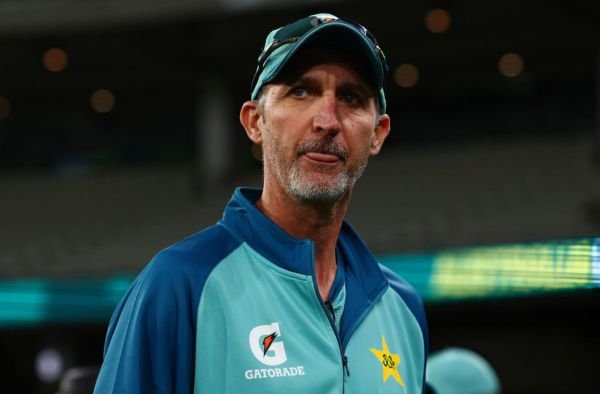There’s a bit of cricket-related drama unfolding behind the scenes—and no, it’s not about an on-field tussle or a shocking upset. This time, it’s a financial dispute grabbing headlines, and the two main characters at the center of it are former Australian fast bowler Jason Gillespie and the Pakistan Cricket Board (PCB).
So, what’s all the fuss about? Let’s break it down in simple terms so that even those who don’t closely follow cricket politics can understand what’s going on.

Who is Jason Gillespie?
If you’re new to cricket or just need a refresher, Jason Gillespie is a familiar name, especially to fans of Australian cricket. He played as a fierce pace bowler for Australia in the early 2000s. After hanging up his boots, Gillespie turned to coaching—and he’s not bad at it either.
Over the years, he’d earned a reputation as a coach who could build solid teams out of raw talent. It’s no surprise then that when the Pakistan Cricket Board was looking for experienced hands to steer their domestic and development programs, they turned to Gillespie.
The Coaching Deal That Fell Through
Back in early 2024, the PCB and Jason Gillespie shook hands on a two-year coaching deal. He was meant to take charge of Pakistan’s National Cricket Academy (NCA) as well as oversee junior and development squads.
Sounds like a decent gig, right? Good money, prestigious position, and a chance to shape Pakistan’s cricketing future.
But here’s the plot twist: before Gillespie could even make the trip to Pakistan and officially start his role, he pulled out of the deal. According to reports, he cited “personal reasons” for his sudden decision to withdraw. Everyone moved on—or so it seemed.
So, What Went Wrong Financially?
Now here comes the juicy part. Even though Gillespie never actually arrived in Pakistan or formally took up the job, he’s asking to be paid for six months—the full value of that period based on the contract he signed.
Yes, you read that right.
The PCB, on the other hand, seems a bit surprised. Their position is that since Gillespie never even set foot in Pakistan to start working, he shouldn’t be owed the full half-year payment.
So what are they doing about it? Apparently, they’re not just rolling over. The PCB has asked for legal advice to figure out whether they’re actually obligated to pay him anything.
Can You Really Be Paid for a Job You Didn’t Do?
That’s the million-dollar (or maybe several-thousand-dollar!) question, isn’t it?
Gillespie claims he deserves what’s due to him because he had officially signed a binding contract. His side seems to argue that since the paperwork was all finalized, and the agreement was firm, he should be paid—regardless of whether he showed up in person or not.
It’s a bit like signing a lease for an apartment, paying the deposit, but then changing your mind at the last minute. Do you get your money back? Well, that probably depends on the fine print. And in this case, the “fine print” is the contract between Gillespie and the PCB.
Why Does This Matter to Cricket Fans?
You might be wondering, “Why should I care?”
Fair question. But here’s the thing—this situation isn’t just about money. It reflects deeper issues in cricket leadership, trust, and communication. And that matters for fans because:
- Unsettled management can affect team performance. If the coaching staff is in disarray or missing, development squads may not get the guidance they need.
- It raises questions about how boards handle hiring. Was there a misunderstanding? Were expectations not clearly laid out?
- Issues like this can damage international working relationships. PCB might be more cautious in future hires, especially with foreign coaches.
Behind the Scenes: What Could’ve Gone Wrong?
While we don’t know everything, here are a few possibilities that might explain this messy situation:
- Miscommunication: Maybe both sides weren’t 100% clear on the contract terms.
- Last-minute change of heart: Gillespie might have gotten cold feet or had something arise personally.
- Delays and logistics: Perhaps travel issues or internal PCB red tape made him rethink the commitment.
Whatever it was, it’s clear that this was more than just a simple job offer falling through.
Lessons Learned (Hopefully!)
This isn’t the first time issues like this have come up in international cricket, and sadly, it may not be the last. But both parties can—and should—learn from the episode.
For future contracts, things like clear exit clauses, timelines, and payment terms need to be defined in black and white. That way, there’s less room for arguments if someone walks away.
Also, for fans and aspiring sports professionals, this is a reminder of how much goes on off the field that can affect what we see on the field.
What Happens Next?
Right now, everything is hanging in the balance.
Here’s what we’re watching for next:
- Will the PCB agree to a settlement? Maybe they’ll compromise and pay part of the amount.
- Will Gillespie take legal action? If things escalate, it could become a full-blown court case.
- How will this affect PCB’s future coaching hires? The outcome might dictate how international candidates view doing business with the PCB.
We’ll just have to wait and see—and hope it doesn’t distract from what truly matters: the cricket.
Final Thoughts
The story of Jason Gillespie and the PCB isn’t just about a paycheck. It’s about commitment, clarity, and how sports organizations handle business when things don’t go as planned.
At the end of the day, money disputes can get ugly, but they also bring important issues to the surface. If handled well, this could be a learning moment for everyone—coaches, boards, and fans alike.